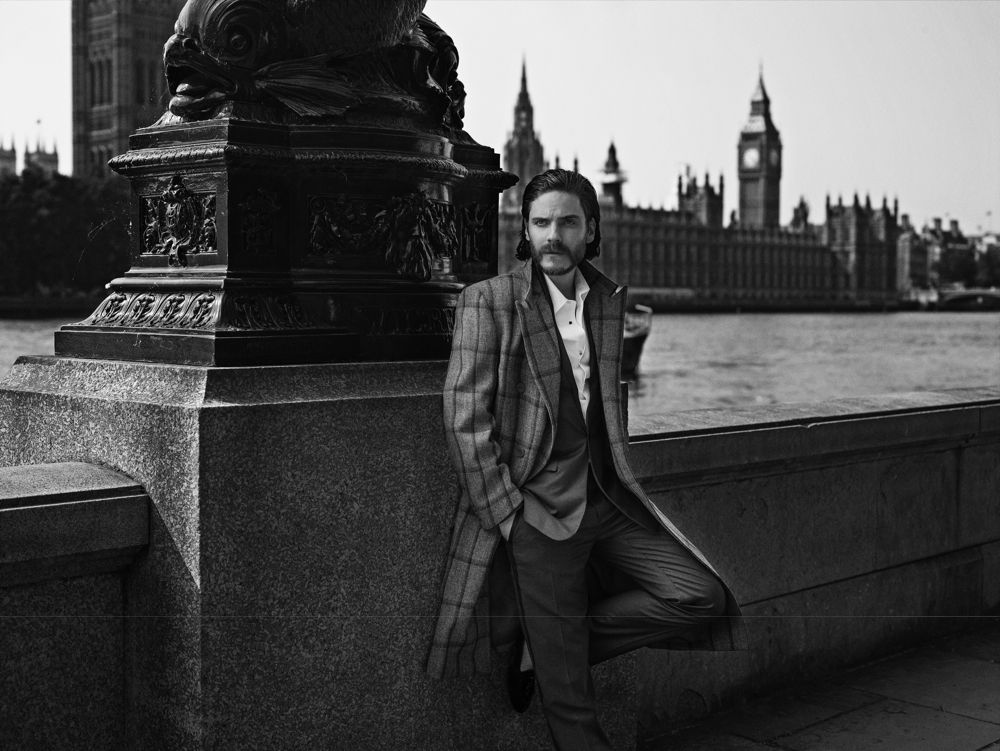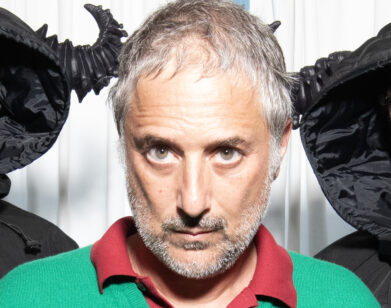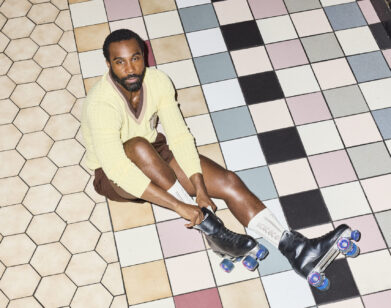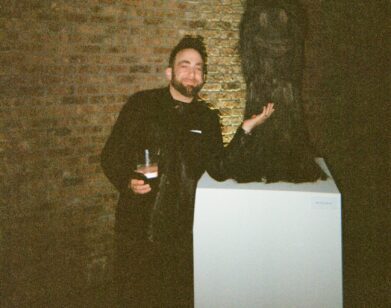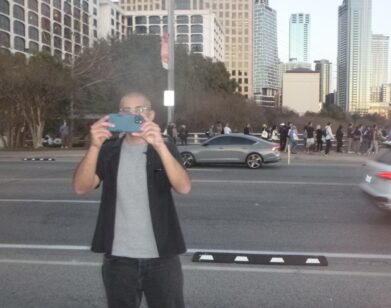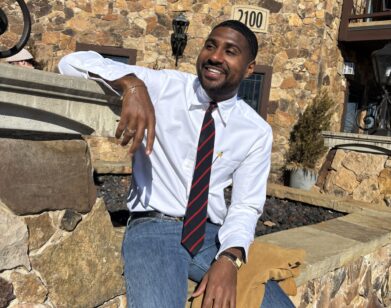Daniel Brühl
We Germans should know that we’re good at constructing cars and we have a lot of good qualities. But we’re not the funniest. Daniel Brühl
After a decade of delivering well-received performances in an impressive run of European films—including Wolfgang Becker’s Good Bye, Lenin! (2003) and Hans Weingartner’s The Edukators (2004)— actor Daniel Brühl is about to become a transatlantic star. This fall, the 35-year-old Spanish-German actor, who makes his home in Berlin, will appear in a couple of highly anticipated new movies based on real events that explore two very different subjects and are set in two very different eras. The first of them, Ron Howard’s Rush, is due out this month and tells the story of the real-life rivalry between Austrian Formula One driver Niki Lauda (Brühl) and Brit James Hunt (Chris Hemsworth), which transfixed the racing world in the 1970s. At the height of his career, the polarizing Lauda—nicknamed “The Rat” because of his buck-toothed grin—suffered a disfiguring accident, only to return to the track mere months later. The second of Brühl’s films, Bill Condon’s The Fifth Estate, hits theaters in October and chronicles the rise and fall of WikiLeaks, starring Brühl as former WikiLeaks spokesman Daniel Domscheit-Berg alongside Benedict Cumberbatch as the complicated figure at the center of it all, the embattled hacktivist and journalist Julian Assange. Of course, things don’t end there for BRÜHL: He also appears in Anton Corbijn’s forthcoming espionage thriller A Most Wanted Man, which co-stars Philip Seymour Hoffman, Rachel McAdams, and Robin Wright, and a second film with Lenin! director Becker, Ich und Kaminski.
Actor and filmmaker Julie Delpy, who has directed Brühl in three films—2009’s The Countess, as well as 2007’s 2 Days in Paris and last year’s 2 Days in New York—recently caught up with him by phone in Brussels, Belgium, where he was filming Ich und Kaminski.
JULIE DELPY: So tell the people how you started this business, Mr. Daniel Brühl.
DANIEL BRÜHL: Well, I started to do theater when I was a little boy at school, and then, I think because my father was a documentary filmmaker and worked for German television, I was of course fascinated by what he did. Then when I was around 15, I did my first movie. I was at a kids’ agency, and the third time I was invited to an audition, they offered me a little part in some kiddie thing, and I earned my first money. I was very proud that I could buy my first mountain bike with my own money. And then I always did it while I was at school. I knew that this was the thing I really wanted to do, and I continued doing it and working ever since. I was lucky at the beginning because I did two student films. Both got a lot of attention at film festivals in Germany. Both of the films were quite charming, and I got a bit of recognition and awards. And next was Good Bye, Lenin! directed by Wolfgang [Becker], the same director who is directing the movie I’m doing right now [Ich und Kaminski]. It’s been something like 12 years, and we hadn’t worked with each other since then. We became close friends so it’s funny to do something completely different and be 35 and not 22 or 23.
DELPY: Why do you like acting? I’m always interested in why people become actors. I question it myself sometimes …
BRÜHL: Well, I don’t know. It has something to do with liking to get attention, and also lying, or pretending something. Like, my special thing as a kid was to play dead because I thought I was really good at it. When I was 7 or 8, I even did it in the bathroom with a hair dryer in the bathtub. I realized that I was good at it because each time my mom would scream.
DELPY: Daniel, that is evil.
BRÜHL: Well, it was fun.
DELPY: So, acting for you is a calling?
BRÜHL: I guess so. That’s what made it so easy in my life. For me, as of the age of probably 15, I was sure that this is the thing I want to do.
DELPY: How is it, Mr. Daniel Brühl, to be a multilingual actor? I know you speak fluent Spanish, German, and English. How does that work for you?
BRÜHL: Well, my first languages are German and Spanish because I was brought up by a Spanish mother and a German father, so I always spoke both languages at home. I’m very thankful that I was brought up in a bilingual house. And then I also have French family who I grew up with in Germany. So when I was a kid, there was always a mixture of different languages. And that is an advantage because I’ve had some moments recently in Germany when I thought, Oh, the German film culture doesn’t interest me that much at the moment. The quality of the movies we had a couple of years ago, I was very happy to participate in…
DELPY: The Edukators and all those films.
BRÜHL: Yeah, and Lenin! It was really a good moment, and now I don’t know why they’re insisting again on doing all these German comedies. I mean, we Germans should know that we’re good at constructing cars and we have a lot of good qualities—as you know, you are together with a German. But we’re not the funniest.
DELPY: But I heard there is a comedy school in Germany where children go to learn humor.
BRÜHL: There’s a comedy school? We should have one—with English teachers or Austrian teachers. The movie I’m doing right now, I was shooting with two Austrians, and they’re so funny. It’s very funny culturally, because you go to this German-speaking country just to the south of Germany, but they have this dark, morbid, strange sense of humor that we Germans don’t have. I think the French are funnier, too. The Spanish are also not that funny in general.
DELPY: They like fart jokes, the French … I mean, every culture is different. I would say Germany is not the top for humor. The point is, though, that you’re tired with the German industry right now in cinema.
BRÜHL: Well, yeah. There’s not that much to do. So then it was an advantage that people caught me from Spain and once in a while in France. And then I was very lucky to meet Ron [Howard].
DELPY: Well, you also did the [Quentin] Tarantino film Inglourious Basterds [2009]. That was a good thing for you, no?
BRÜHL: Absolutely. It was the first time I got in touch with a star director like him—and on a big movie. Of course, it was good for all of us. I mean, especially for Christoph Waltz. I’m so happy for him because he’s been really—wow—like a rocket. It’s incredible how a life can change with one movie and one great part.
DELPY: Yeah … That’s never happened to me, but that’s another story. [both laugh] So how was your experience on Inglourious Basterds?
BRÜHL: I was very happy and scared at the same time for my first meeting with Quentin. I didn’t have to go to an audition first before meeting him. We had dinner in a hotel and I was very well prepared. I know that he’s a movie encyclopedia, and I knew that he would talk a lot about German movies and ones of that period, of the ’30s and ’40s. I thought, Well, I’ve seen a couple, so it’s going to be fine. So I was showing off and telling him about movies that could be a reference to the movie he wanted to make, and he said, “Yeah, yeah. That’s great. But I’m sure you know this other film that’s much better.” I was drinking white wine and basically lying, like, “Yeah … Of course!” [laughs] Then, at the audition, I was again lying because he didn’t have the French version of the script yet, but he knew he wanted to shoot my scenes in French. I said, “That’s not a problem. I can translate it right away.” But my French, as you know, is not that good, so I mixed all the words that I didn’t know in French and said them in Spanish because I knew, you know, the Americans, they wouldn’t—
DELPY: They can’t tell the difference.
BRÜHL: Yeah. So it was a mixture of French and Spanish—and it worked.
DELPY: Did you ever tell him that?
BRÜHL: Yeah, I did. I had to because it was so embarrassing. He laughed a lot.
DELPY: After you signed your contract, though, right?
BRÜHL: Yeah, of course. [laughs] That was an interesting experience because I’m shit in auditions.
DELPY: Me, too. I’m very careful with that process as a director because, sadly, I’ve noticed that some people are not great at auditions but are better actors, and there are some who are really great at auditions but will never get better than that.
BRÜHL: Totally. You have to go to these offices that are white and full of DVDs from other actors, and there’s a table and a chair, and it looks like a prison, and then you’re supposed to fill that room with life. Why not choose a nice environment? Do it outside or in a private apartment, put on some music …
DELPY: French directors do that in their bedrooms, usually, and it’s not great for the actress. [both laugh] But let’s focus on your career, Mr. Daniel Brühl. How was Rush? How was it working with Ron Howard?
BRÜHL: After five minutes, I fell in love with Ron. He gave me such confidence. Normally, they let you wait two weeks and then call you and say, “Yeah, it was awesome, but you didn’t get the part.” But after three days, I was in Spain overtaking a truck, and my girlfriend was screaming at me, “You are not a Formula One rally driver. You’re not even a good driver. Stay behind the truck!” Then I looked at my mobile and saw three messages from London. I called my agent in London and was told that Ron was offering me the part.
DELPY: And you don’t know how to drive …
BRÜHL: He’s a legend, and I don’t know how to drive. [laughs] So before I met Ron the second time, I did a Formula Three course on my own. It’s like a lower division from Formula One and you can drive Formula Three cars. I did this in Spain to get used to these racing cars, and I thought, Wow, I can totally understand the adrenaline and the addiction to it. So I drove better when I met him the second time. Also, I wanted to get the Austrian accent right because Niki Lauda speaks with quite a thick accent, so I managed to find a dialect coach in Vienna and spent four weeks preparing. That was the first time I met Niki Lauda, who is fascinating. It was so much fun to play this guy, because he’s a straightforward, undiplomatic guy. I can remember our first conversation on the phone: He called me and said, “I guess we have to meet now.” He said, “Come to Vienna and just bring hand luggage in case we don’t like each other—then you can piss off.” [laughs]
DELPY: And is it good to be able to impersonate someone who is still alive? Did you find it helpful to meet him and get a sense of him?
BRÜHL: Oh, yeah. I think that was a crucial. Of course, it helped a lot that he liked me because he’s really quite frank and he doesn’t give a shit. That’s a very Viennese thing. If he had hated me, he would have told me. So I was really nervous when I met him because Austrians and Germans have this strange relationship. I thought, Oh god, I hope he doesn’t think I’m a German wimp. But we really liked each other. On the last day I was in Vienna, he said, “Well, if you want to come with me in my private jet”-because he’s a pilot, too-“to fly to São Paulo to the Grand Prix to meet the drivers …” So I went, and he introduced me to Formula One drivers.
DELPY: So you also have The Fifth Estate?
BRÜHL: Yeah. It’s coming out soon after Rush. It’s going to be very interesting because with Edward Snowden and the whole WikiLeaks subject in the media again, it’s such a sensitive subject. Julian Assange is such a divisive guy.
DELPY: Did you meet him?
BRÜHL: I went with Benedict Cumberbatch to the embassy in London to listen to a speech that Assange gave before Christmas, which was very interesting. He’s very good at giving speeches, I must say. He has a big charisma. I also read all these different versions of the whole thing. I read the book of the character that I’m playing [former WikiLeaks spokesman] Daniel Domscheit-Berg, and then I read the book by the Guardian journalists [WikiLeaks: Inside Julian Assange’s War on Secrecy, by David Leigh and Luke Harding] and this unauthorized autobiography of Assange [Julian Assange: The Unauthorised Autobiography]. It’s really weird to see where the truth is, you know?
DELPY: Did you meet Daniel Domscheit-Berg?
BRÜHL: Yeah, I met him a couple of times. That was reassuring to meet him, because I didn’t have any reason to not trust his integrity and not believe in his words. He’s a true activist and he started a new thing called OpenLeaks.
DELPY: It’s seems the problem with Assange is his search for power and attention. It seems a little confusing in terms of who he is and what his motives are. There’s a bit of cult of personality with him, which is always worrisome.
BRÜHL: When you read his biography, there are some chapters about his childhood and youth, and he was betrayed early on when he was a hacker. So there is a logical consequence that this guy is paranoid. But still, as you said, as soon as you get power and things become big and overwhelming, then people change.
DELPY: So what’s next for you, Mr. Daniel Brühl?
BRÜHL: Well, I’m going to eat some moules frites.
DELPY: That’s exciting.
BRÜHL: In the fall, I will either work with one or the other great director. They’re both directors, so I’m excited either way. I also hope that I’ll have a bit of time off in Berlin because I haven’t been home for two months. And I still have this tapas restaurant that I’m part of. I want you to come! It’s a really cool place in Berlin, in Kreuzberg. I’ve had it for two years now and we’re still not bankrupt. People love the place. And I’m so proud of it. When we opened it, I was prouder than at a premiere of a movie. My mum also liked it.
DELPY: So you’re a movie star, but you’re really much more interested in your tapas restaurant.
BRÜHL: Yeah, in a way … Sometimes.
JULIE DELPY IS THE WRITER AND DIRECTOR OF 2 DAYS IN PARIS, THE COUNTESS, AND 2 DAYS IN NEW YORK. SHE HAS STARRED IN EUROPA EUROPA, THREE COLORS: WHITE, AND IN RICHARD LINKLATER’S BEFORE SUNSET TRILOGY.

